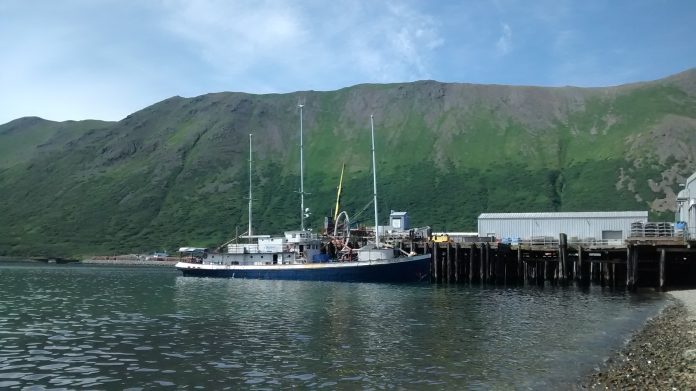A three-judge panel of the Ninth U.S. Circuit Court of Appeals overruled a lower court’s rejection of a land exchange agreement on a remote Aleutian Island.
The appeals court rejected a district court’s 2020 ruling that blocked the Trump-era Department of Interior’s (DOI) approval of a long-desired one-lane gravel roadway for transporting medical emergency patients on land from the tiny village of King Cove to a medical facility in Cold Bay currently accessible only by air and water.
The area is known for heavy storms and high winds that often make air and water transport impossible.
Authorized Under Obama
In 2009, Congress authorized the U.S. Secretary of the Interior to conduct a land exchange with the King Cove Corporation for an access road.
King Cove was to transfer an agreed-upon area of land to the United States in exchange for the federal government transferring “all right, title, and interest of the United States” across a portion of the Izembek National Wildlife Refuge for construction of an all-terrain vehicle gravel pathway across the tundra to provide access to and from the Cold Bay Airport primarily for noncommercial health and safety purposes.
Four years later, Sally Jewell, Interior secretary under President Barack Obama, opted not to proceed with the exchange, citing “difficult and controversial issues of public policy.”
In 2018, the DOI reversed course, approving the congressionally authorized land-exchange agreement for a corridor encompassing fewer than 500 acres. In approving the exchange, DOI Secretary Ryan Zinke relied on a provision of the 1980 Alaska National Interest Lands Conservation Act (ANILCA) that allows land exchanges with Alaska Native village corporations.
For the Birds
Led by Trustees for Alaska, nine environmental groups sued to block the exchange, arguing it would disturb migratory birds’ habitat. The groups included the Defenders of Wildlife, the Center for Biological Diversity, the National Audubon Society, and the Sierra Club.
The U.S. District Court for the District of Alaska agreed and vacated the 2018 agreement.
A year later, new Interior Secretary David Bernhardt approved King Cove Corporation’s request for a similar land swap, on the grounds it could save human lives.
Bernhardt said the land swap struck a proper balance between protecting scenic, natural, cultural, and environmental values and providing for the long-term social and physical wellbeing of the Alaska Native people.
In its record of decision, the DOI noted more than 70 people had been airlifted from King Cove to hospital facilities in Cold Bay, Anchorage, or Seattle since 2013, with more than 20 of those trips having been handled by the U.S. Coast Guard at a cost of $50,000 per mission.
Bernhardt’s review also cited a 2015 study of transportation alternatives prepared by the Army Corps of Engineers that determined nonroad alternatives were prohibitively costly and insufficiently dependable.
Back to Court
The same coalition of environmental groups sued once again to block the land exchange and once again received a favorable opinion from the federal district court vacating the land swap agreement.
Now led by Interior Sec. Deb Haaland, the DOI appealed the decision. The appeal had the support of King Cove Corporation, the Agdaagux Tribe of King Cove, the Native Village of Belkofski, and the state of Alaska.
In a majority opinion, a three-judge panel of the Ninth Circuit Court of Appeals reversed the district court’s ruling, finding the land swap decision violated neither ANILCA nor the 1946 Administrative Procedures Act.
The appeals court ruled it was within Bernhardt’s discretion to grant the land exchange.
“Congress gave the Secretary discretion to strike an appropriate balance between environmental interests and ‘economic and social needs,’” wrote Judge Eric Miller for the majority. “Secretary Bernhardt exercised that discretion when he found that, without a road, the economic and social needs of the people of King Cove would not be adequately met.”
Completion of the road could be a long way off even if the current decision stands. Numerous agencies will have to sign off on road construction permits, requiring detailed environmental reviews, before a road can be constructed on the land that was exchanged.
Activists vs. Residents
The groups fighting against construction of this one-lane road are ignoring the health and safety needs of an isolated Alaskan community, says Bethany Marcum, chief executive officer of the Alaska Policy Forum.
“The thousand people living in King Cove lack access to medical facilities in periods of what has been called the world’s worst weather, when boats and helicopters often cannot travel even the short distance between King Cove and Cold Bay,” said Marcum. “Meanwhile, people are allowed to walk on the tundra and traverse it without bothering the swans, and the brant geese do not come inland. Alaska has a very poorly developed infrastructure, and this roadway would enable offroad vehicles to transport people for emergency medical care.
“It would have been far easier to use the old military roads and trails, but they are now overgrown thanks to federal policies,” said Marcum. “Not allowing the roadway constitutes disproportionate punishment of King Cove residents and visitors who cannot navigate the bay in the frequent bad weather. This emergency roadway has long been needed, and further delays will likely have grave consequences for some of them.”
Duggan Flanakin (dflanakin@gmail.com) writes from San Marcos, Texas.



























[…] article was originally published by The Heartland Institute on April 14, […]